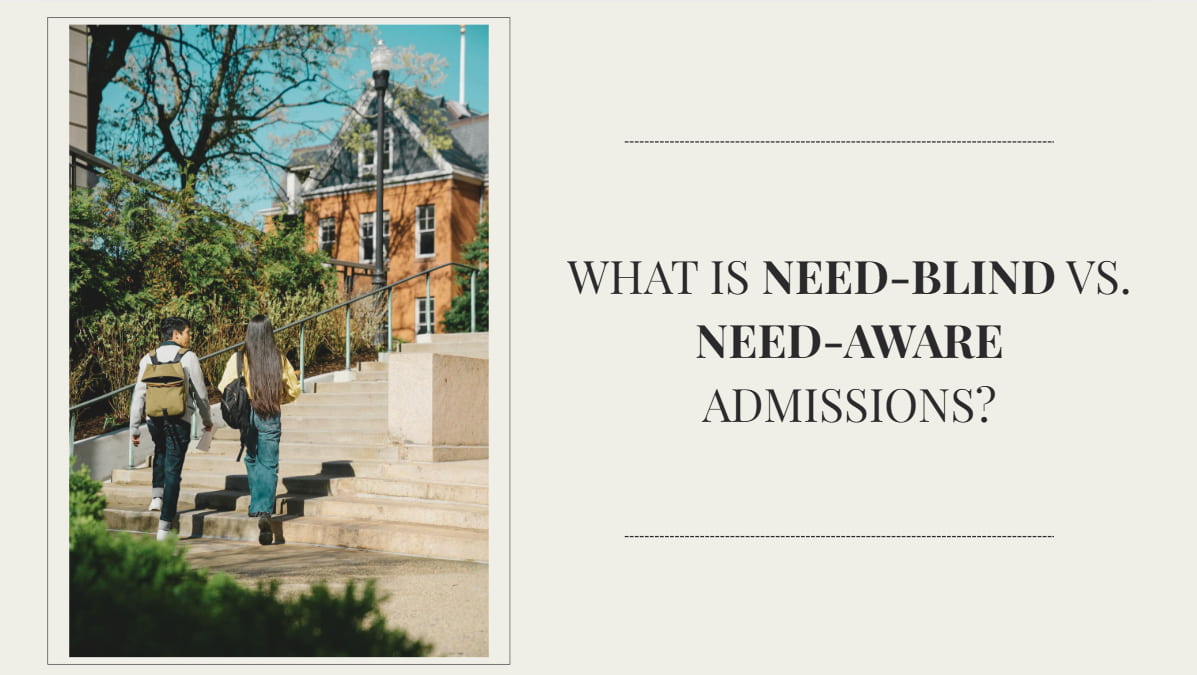There is a lot of talk about need-blind vs. need-aware admissions, but many students don’t know what they really mean. You must understand the difference between these policies because they can affect both who gets admitted and how much financial aid is given. And from my experience as a college admissions consultant, I know that this question is one of the most important and least known parts of the application process.
I’ll break down the details of need-blind vs. need-aware colleges, give you some examples, and then share my own ideas on how to plan your college list carefully.
What Does Need-Blind Admissions Mean?
Simply defined, if a college has a need blind admissions policy, it means that the admissions committee will not take your financial situation into account when evaluating your application. In my experience, this method is supposed to show off a student’s grades, extracurricular activities, college essays, and general potential, not their ability to pay. In other words, choices are made based on who you are and what you’ve accomplished, not on the financial background of your family.
Some of the most well-known institutions in the U.S. follow this system. For example, Harvard, Yale, Princeton, and MIT all admit students without considering financial need for domestic applicants.
Still, students should know that this policy does not always apply to international applicants, since only a small group of colleges extends the same treatment to students worldwide.
To better understand need-blind admissions, keep the following points in mind:
- Your financial need is not part of the admissions decision.
- You still need to apply separately for financial aid.
- Admission does not guarantee that all costs will be covered.
- Only a limited number of colleges extend this policy to international students.
Need-blind admissions allow students from different financial backgrounds to have the same chances. But I usually tell families to look at each college’s financial aid policies very carefully, since admission itself doesn’t always imply affordability.
Pros & Cons of Need-Blind Admissions Policy
| ✅ PROS | ❌ CONS |
|---|---|
| Admissions decisions are based only on academic and personal merit, not financial status. | Being admitted does not guarantee that your financial aid package will fully cover costs. |
| Creates a perception of fairness and equal opportunity. | Only a few colleges and universities extend the policy to international students. |
| Helps create a more diverse student body with people from all backgrounds. | Even at need-blind schools, some families still struggle to afford the bill. |
| Reduces stress for applicants worried about how need might impact their chances. | Colleges have to stretch their budgets, which can limit how much aid they can actually give. |
What Is a Need-Aware Admissions?
In contrast, need aware colleges take into account applicants’ financial situation when making admissions decisions. Essentially, your ability to pay may become one of the many factors considered, especially when colleges are close to filling their class and managing a limited financial aid budget.
Schools like Tufts, NYU, and Wesleyan fall into this category. These are excellent institutions, but they sometimes need to weigh an applicant’s financial need alongside academic merit.
That doesn’t mean students who need financial aid are automatically rejected. In fact, I’ve seen many students with significant need get admitted to need-aware schools. However, the reality is that your financial circumstances might make the process more competitive compared to students who can pay the full cost.
Many colleges also apply a mixed approach, being need-blind for most applicants but switching to need-aware when resources become tight.
Pros & Cons of Need-Aware Admissions Policy
| ✅ PROS | ❌ CONS |
|---|---|
| Schools can manage their financial aid budgets more realistically. | Your need for financial aid might lower your chances of getting accepted. |
| Students who are admitted often get stronger aid packages, since the school planned for it. | It can feel discouraging knowing that money is part of the decision. |
| Helps colleges stay financially stable so they can keep offering aid long-term. | International and high-need applicants may face tougher odds. |
| Still gives opportunities for students with need (many do get admitted every year). | Another layer of stress to an already competitive process. |
Need-Blind vs. Need-Aware Colleges: Which Is Best for You?
Choosing between need-blind and need-aware institutions is all about finding the best match for your academic goals, financial situation, and peace of mind. Let’s break it down.
Consider Your Financial Need
If you know you will rely heavily on financial aid, start by looking at schools that promise to meet full need for admitted students.
A need-blind college that also promises to cover your full demonstrated financial need is the best compromise: your ability to pay won’t affect your chances of getting in, and you’ll get help once you’re there.

Demonstrated need is the difference between what a college claims it costs to attend and what your family is required to contribute. The school determines it using the FAFSA, CSS Profile, or both.
Say the total cost of going to college is $70,000, and your family is only going to pay $20,000. This means you have a demonstrated need of $50,000.
For accepted students, schools that commit to meeting full demonstrated need will put together an aid plan (including grants, scholarships, work-study, and occasionally loans) to make up the difference.
Review Each School’s Aid Policies
Don’t think that a need-blind policy always means generous help because each school may handle aid in a different way. So, carefully read the admissions and financial aid pages before you apply to colleges and compare how each college or university explains its full policies.
Things you should ask the admissions office:
- If a student is accepted, does the school meet their full demonstrated financial need?
- Is most of the aid in the form of grants and scholarships, or are there also loans?
- How many years of aid are you sure you’ll get, and are there GPA requirements?
- Are there limits on the amount of financial aid that foreign students can get?
Some need-blind colleges enroll students without ensuring enough financial aid. On the other hand, some need-aware institutions nevertheless provide strong packages.
Think About Your Competitiveness as an Applicant
At a need-aware college, a student’s financial background may become a factor if the application is borderline.
If your academic record and extracurricular profile are strong, your financial need may have less of an impact. But if you are applying with weaker grades or test scores, a need-aware policy could reduce your chances.
Factor in Overall Fit, Not Just Policy
When deciding where to apply to colleges, it’s easy to focus only on whether a school is need-blind or need-aware. However, admissions and financial aid are just part of the decision.
The right fit also depends on academic programs, faculty support, campus culture, location, and career resources. A school may be affordable but still not align with your goals (or it may be the opposite). It’s important to find a balance between the two.
Use Net Price Calculators
Before you make a final college list, try each school’s net price calculator. This tool gives an estimate of what you’ll actually pay after aid is applied.
Sometimes, a need-aware college or university may cost less than a need-blind one, depending on how they package scholarships and grants.
This step helps you consider your financial situation realistically and avoid surprises later.
Which Colleges Are Need-Blind and Need-Aware?
Some colleges are truly need-blind for everyone and commit to meeting full demonstrated need, while others are only need blind for domestic students and take finances into account for international applicants.
The majority of schools fall somewhere in between, so it’s essential to review each college’s policies carefully.
Need-Blind for All Applicants
Only a small group of colleges and universities are both need-blind for all applicants (including international students) and promise to cover 100% of demonstrated need.
This group currently includes:
- Amherst College
- Bowdoin College
- Brown University (starting with the Class of 2029 for international first-years)
- Dartmouth College
- Harvard College
- MIT
- Princeton University
- Yale College
At these schools, the college doesn’t consider an applicant’s financial need during admission and guarantees sufficient financial aid for the students they accept.
Need Blind for Domestic Students
Many selective colleges are need blind for domestic applicants, meaning they make admissions decisions without considering finances for U.S. citizens and permanent residents. However, they may be need-aware for international students.
- California Institute of Technology (Caltech)
- Columbia University
- Cornell University
- Duke University
- Johns Hopkins University
- Pomona College
- Stanford University
- University of Chicago
Most of these schools also promise to meet full demonstrated need for domestic students.
Need-Aware Colleges
Some well-regarded colleges openly state they are need-aware for at least some applicants. That means financial circumstances may play a role in admissions decisions, especially when funding is limited.
- Northeastern University
- Tufts University
- Bates College
- Bryn Mawr College
- Carleton College
- Colgate University
- Loyola Marymount University
- Smith College
- Washington University in St. Louis
- Wesleyan University
Even so, many of these schools provide strong aid packages to the students they accept.
Final Tips
So, which option is best? The answer depends on your financial situation and priorities.
If you require significant aid, a need-blind school that meets full demonstrated need may be the best option. On the other hand, if you can afford most or all of the tuition, a need-aware option may still be a good fit, especially if it aligns with your academic and career goals.
In the end, the “best” choice depends on how well a college supports you academically, financially, and personally.
And if you’d like expert help sorting through applications, the Best College Admission Consultants will make the process less stressful. Sometimes having a pro in your corner makes a big difference when choosing a college.

